Dedicated to Tata Barbalato


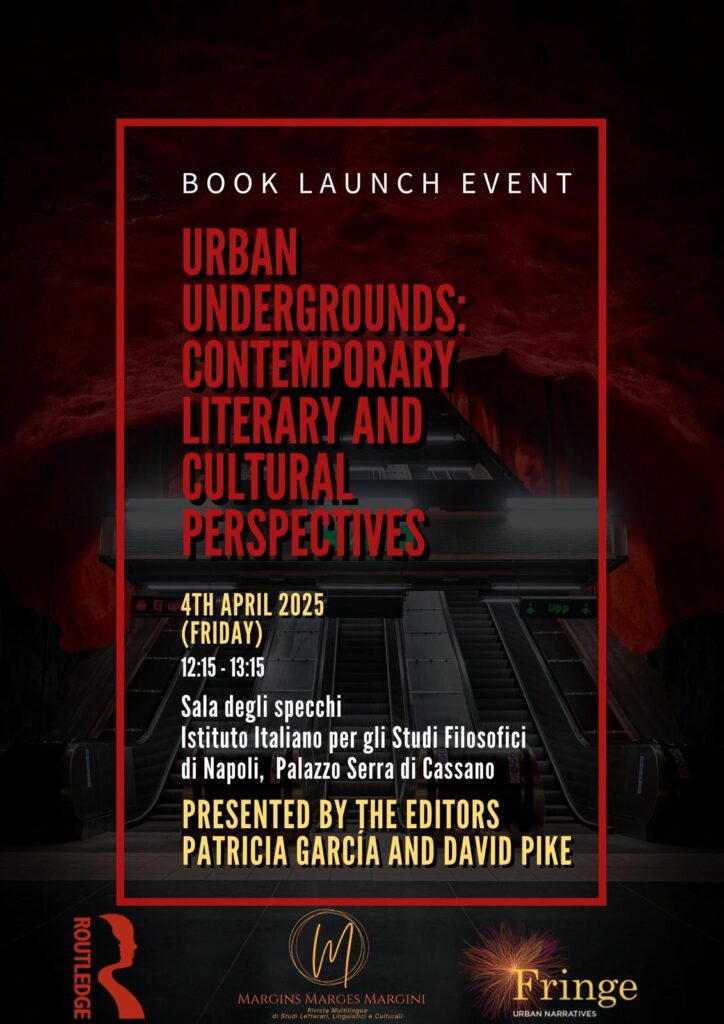
International Conference
Underground Imaginaries 2025:
Spaces In Between
3-5 April 2025
Istituto Italiano per gli Studi Filosofici di Napoli
Parthenope University of Naples
Conference Programme [EN/IT] ⬅




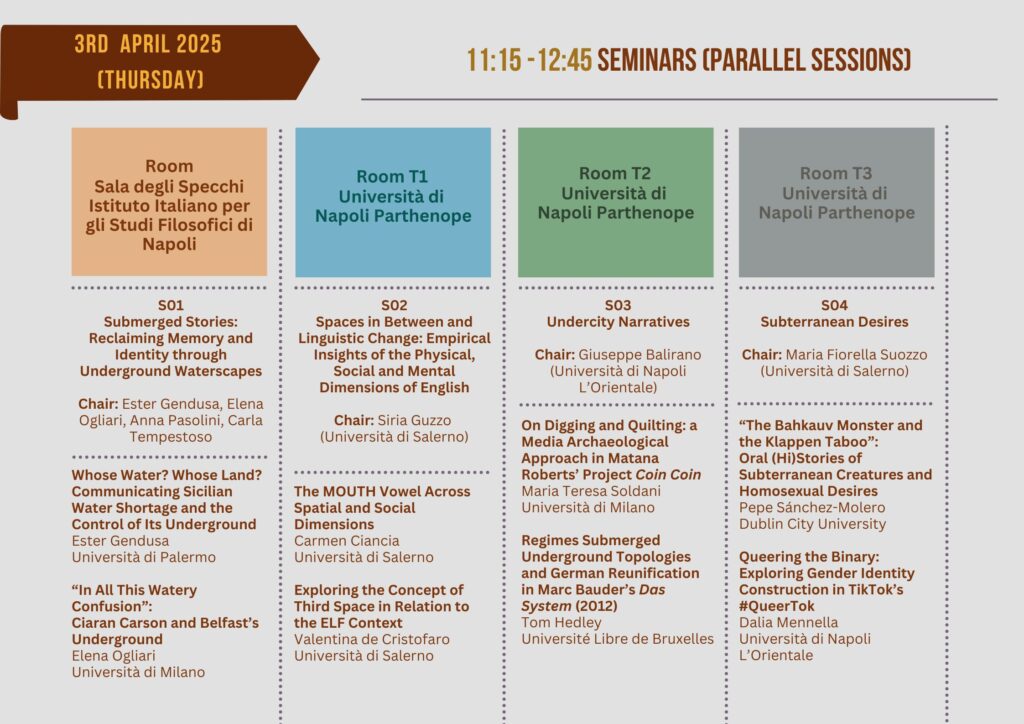






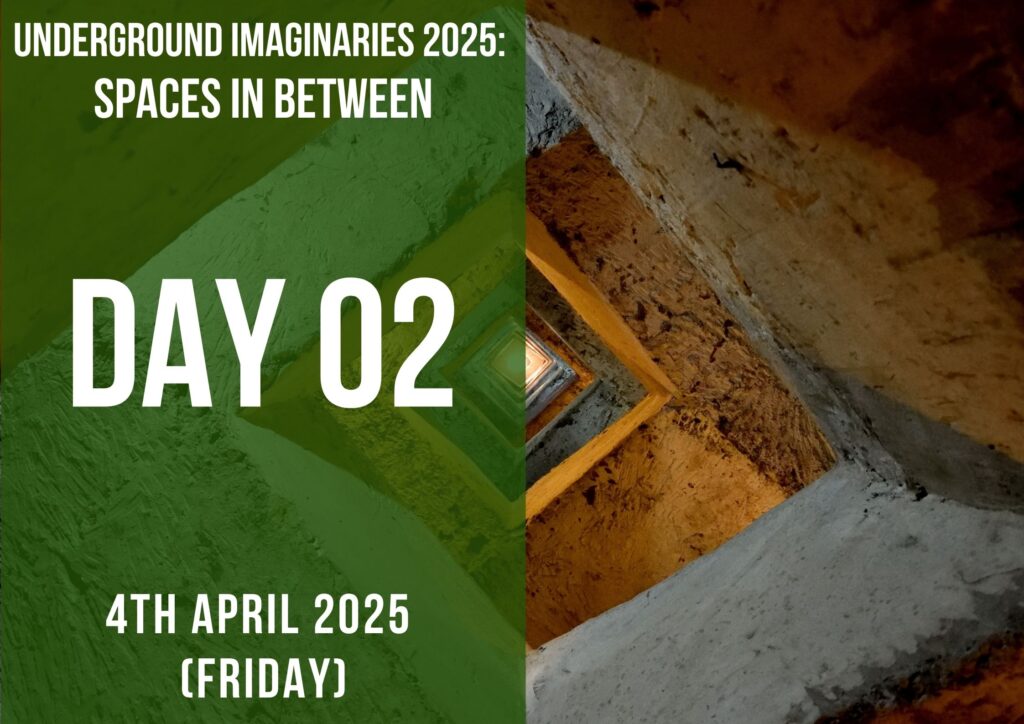



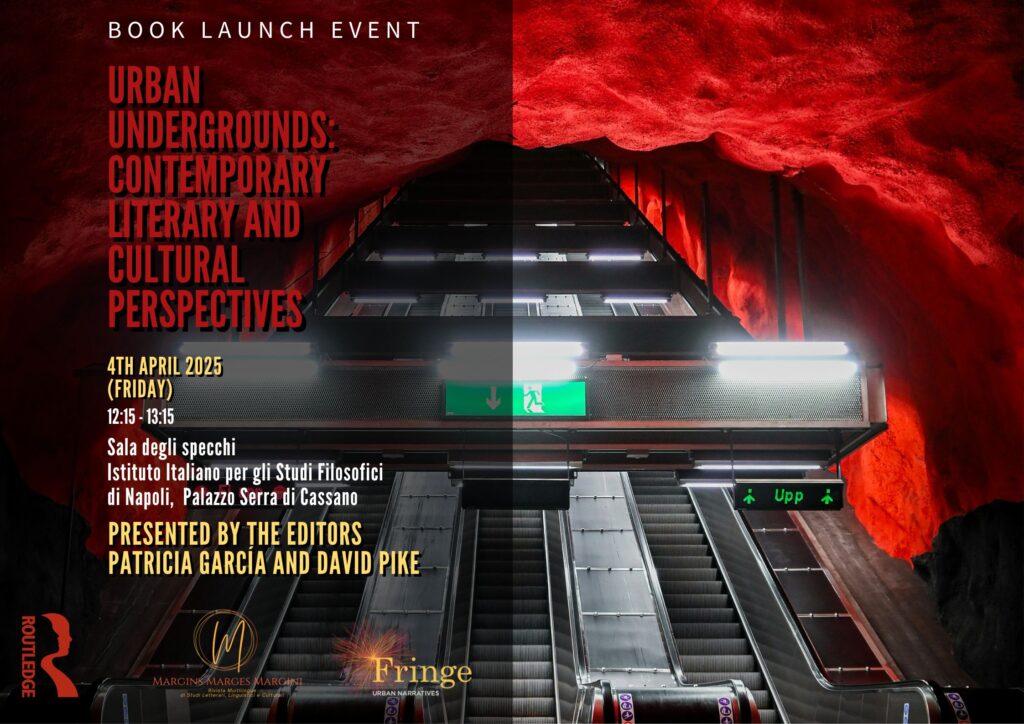


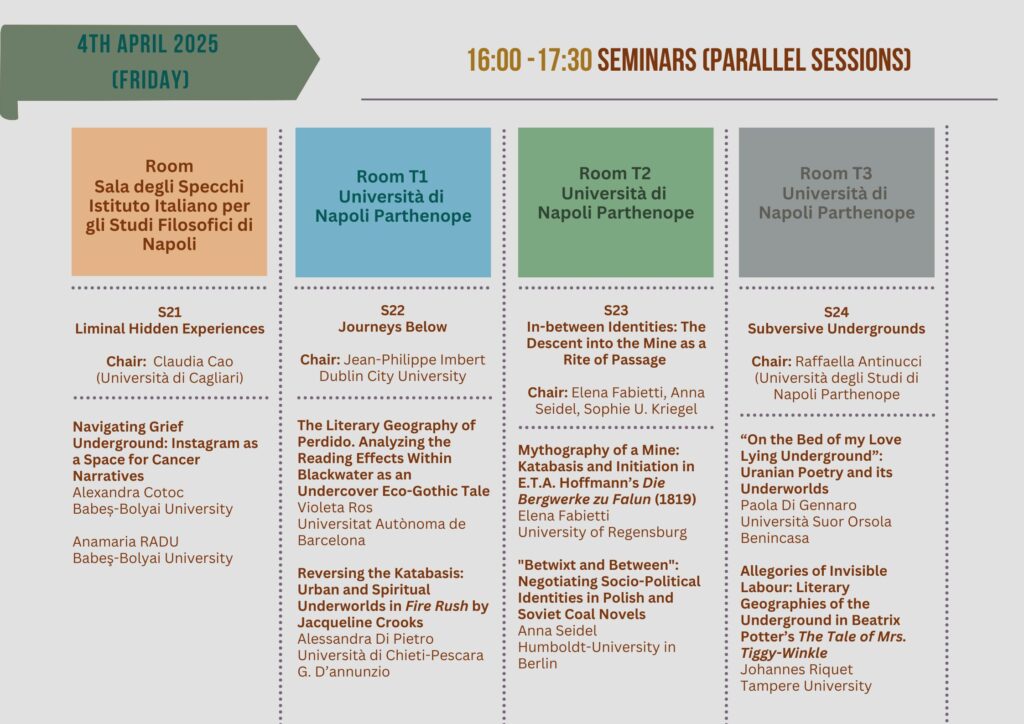
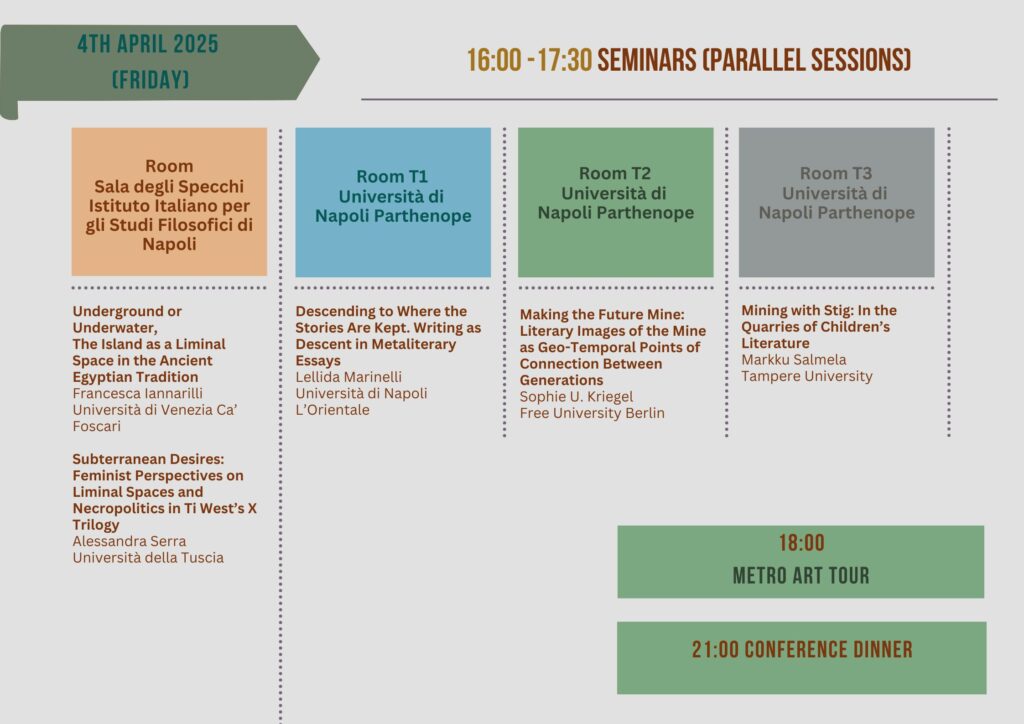

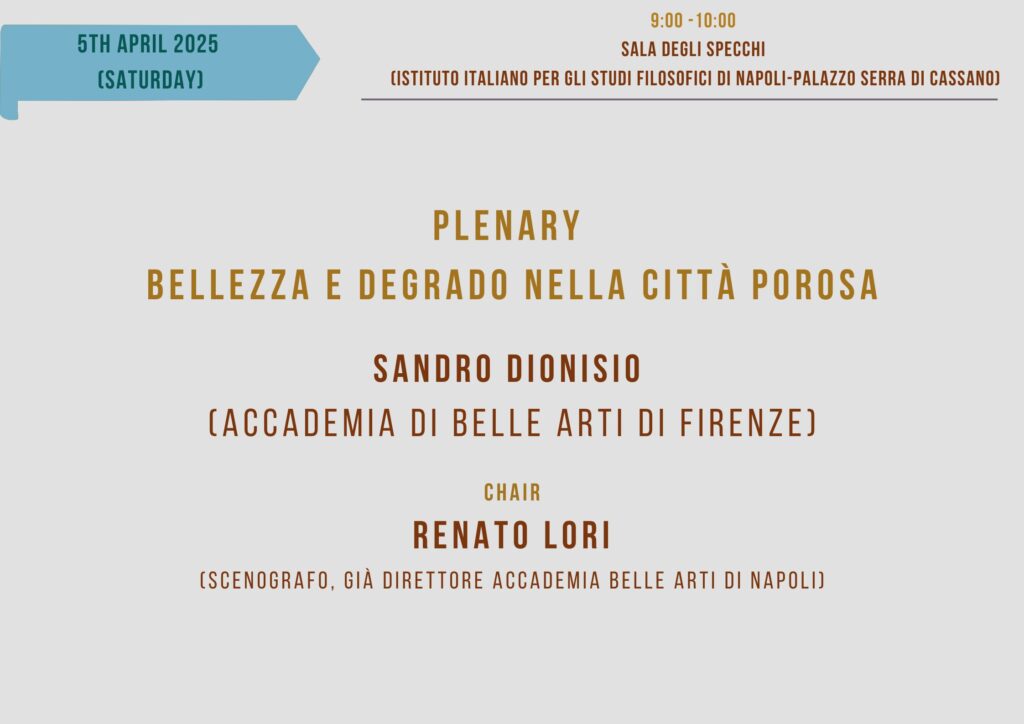


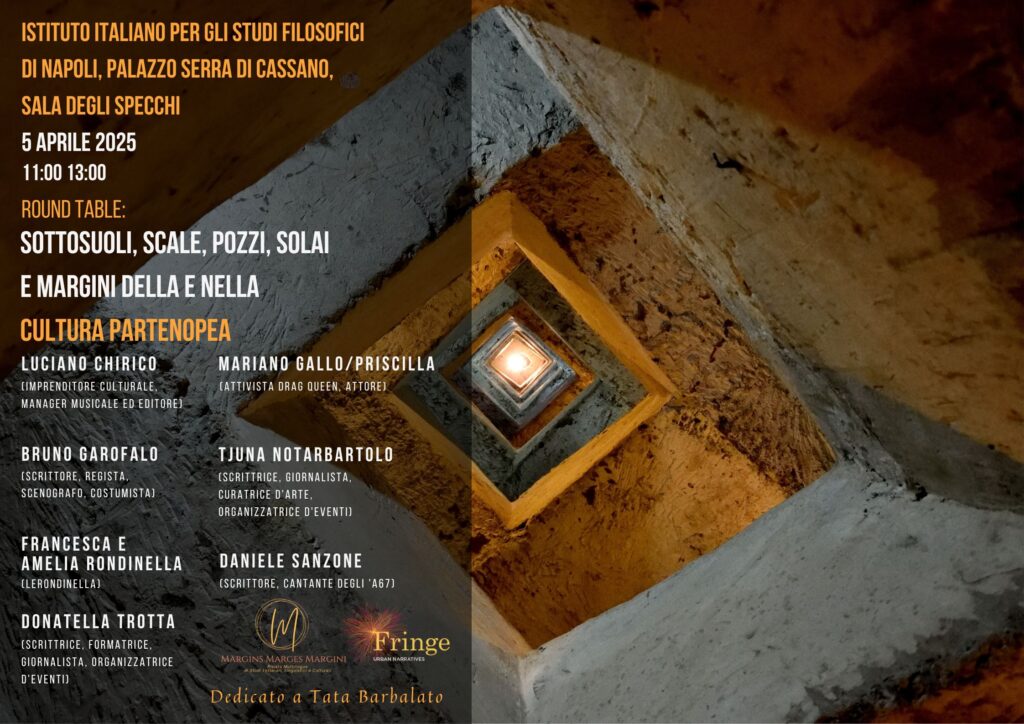


Payment Form for Underground Imaginaries 2025 Conference Fees Now Available at the following link:
https://forms.gle/rR86QnhJCgXQJB8Z9
Per la versione in lingua italiana si veda di seguito
Call for Papers [EN]
The Vertical Turn in the Humanities and Social Sciences has prompted an epistemological shift, advocating for the examination of spaces in terms of thickness and volume, as opposed to the horizontality typically depicted in most cartographies. In line with this paradigm, a critical understanding of underground infrastructure becomes essential. This conference builds on this shift to delve deeper into below-ground perspectives within literary, cultural and language studies.
A critical understanding of the underground examines how spaces are socially constructed, inhabited and aesthetically portrayed. This analytical endeavour entails engaging with the dual structures that shape the above-below relationship (for example, light-dark; good-bad; allowed-forbidden). Our conference aims to move beyond these dichotomies and adopt a dynamic framework in the analysis of literary and cultural works. In this context, we envision the underground as a constellation of interlinked realms.
From transitional mythical and metaphorical spaces to liminal rites bridging worlds, from present-day metro passages to meeting points between the living and the deceased, the conference will particularly focus on threshold spaces and narratives of descent, encounters, and metamorphosis. As Rachel Falconer writes in Hell in Contemporary Literature, “there are as many routes through hell, as there are minds to imagine them” (2019: 6). Hence, we seek to explore these access points, passages, gateways, liminal creatures, communication systems, networks and other epistemologies of transience, suspension and connection within the underground.
Topics of interest include but are not limited to literary and cultural studies in the following areas:
- Spatial Humanities: perspectives on transitions, margins, borders, and thresholds in underground spaces.
- Gender and Sexuality Studies: analyses of liminal spaces and dissident sexualities and their relation to the underground (sex parties, public sex, cruising, sex work, prostitution etc.).
- Memory Studies and negotiations with the past in subterranean narratives.
- Migration Studies: hiding underground, trafficking, being undercover, isolation, fear, identity studies, trauma studies, in/visibility studies and in/visibilisation, secrecy, silence, precarity, slavery.
- Mythical and Metaphorical approaches: liminal symbols and motifs of the underworld (katabasis, infernos, caves, labyrinths, cenotes).
- Mobility Studies Focusing on tunnels, underground portals, lifts, stairs, escalators, excursions, rites of passage, transitions and borderlands.
- Necropolitics: burial grounds, inhumation/exhumation, mass graves, mourning, subterranean genealogies, archives, ruins.
- Night Studies: nocturnal regimes, twilights, liminal temporalities.
- Urban Cultural Studies: passages, systems, underground urban architectures in cultural texts (sewers, bunkers, tunnels, catacombs, ghost metro stations, domestic undergrounds).
Abstract/Panel Submission [EN]
Please note that abstracts should be submitted with a short bionote to naplesunderground2025@gmail.com and must not exceed 300 words in length.
Deadlines [EN]
- Deadline for Abstract Submission: 30/11/2024
- Notification of Acceptance by the Organizing Committee: 19/12/2024
- Registrations:
- – Early-bird Fee: (27/01/2024-28/02/2025), 70 euros
- – Regular Fee: (28/02/2025-28/03/2025), 100 euros
- – Payment Form for Underground Imaginaries 2025 Conference Fees: https://forms.gle/rR86QnhJCgXQJB8Z9
- Final Program: 22/03/2025
- Conference Dates: 3–5/04/2025
- On-site registration is not available
Keynote Speakers [EN]
Iain Chambers
Writer and Independent Researcher, former Full Professor of Cultural and Postcolonial Studies (University of Naples “L’Orientale”, IT).
Title: Torn Maps and Holes in Time

Sandro Dionisio
Musician, Playwright, Screenplayer and Director, Professor (Academy of Fine Arts in Florence, IT).
Title: Bellezza e degrado nella città porosa

Rita Lucarelli
Associate Professor of Egyptology (University of California, Berkeley, USA).
Title: Doorscapes Of The Netherworld: A Humanist Geographical Perspective Towards The Ancient Egyptian Underground Imaginaries

Eleonora Rao
Associate Professor of English Literature (University of Salerno, IT).
Title: Thinking about Liminal Space in Literary Studies
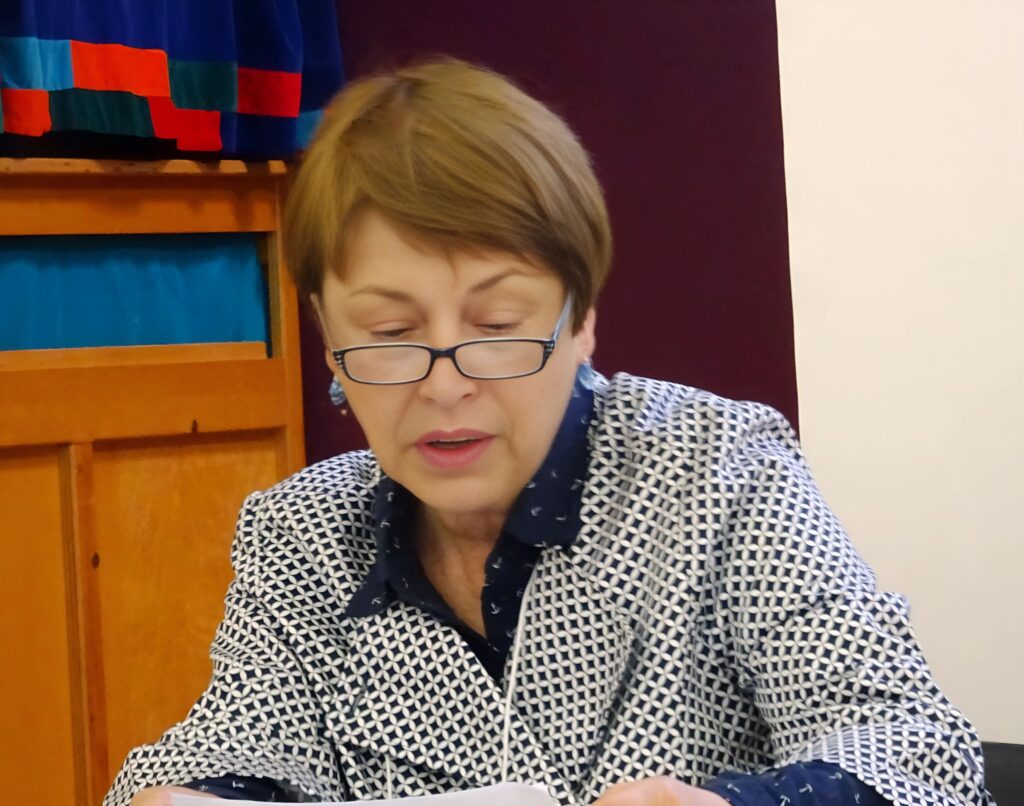
Guests [EN]
- Tata Barbalato (Artist, Scenographer, Costume Designer, Performer)
- Luciano Chirico (Literary Editor, Music Producer, Event Curator)
- Rachel Falconer (Digital Art Curator, Researcher, Writer)
- Bruno Garofalo (Director, Scenographer, Costume Designer, Writer)
- Tjuna Notarbartolo (Journalist, Writer, Translator, Literary Critic, Director of the Elsa Morante Literary Prize)
- David Pike (Professor of Literature, American University Washington D.C.)
- Daniele Sanzone (Writer, Singer of the Rock Band A67)
Scientific Committee [EN]
- Brînduşa-Mariana Amălăncei (University of Bacau, RO)
- Raffaella Antinucci (Università degli Studi di Napoli Parthenope, IT)
- Giuseppe Balirano (President of The Italian Association for the Study of English, AIA; L’Orientale – Università di Napoli, IT)
- Linda Barone (Università degli Studi di Salerno, IT)
- Mihaela Culea (University of Bacau, RO)
- Lucia Esposito (Università degli Studi Roma Tre, IT)
- Patricia García (Universitat Autònoma de Barcelona, ES)
- Jean-Philippe Imbert (Dublin City University, IE)
- Proshot Kalami (Norfolk State University, USA)
- C. Bruna Mancini (Università della Calabria, IT)
- Elisabetta Marino (Università degli Studi di Roma Tor Vergata, IT)
- Alessandra Ruggiero (Università di Teramo, IT)
- Nicoletta Vallorani (Università degli Studi di Milano Statale, IT)
Organizing Committee [EN]
- Raffaella Antinucci (Università degli Studi di Napoli Parthenope, IT)
- Giuseppe Capalbo (Università degli Studi di Roma Tor Vergata, IT)
- Patricia García (Universitat Autònoma de Barcelona, ES)
- Jean-Philippe Imbert (Dublin City University, IE)
- C. Bruna Mancini (Università della Calabria, IT)
- Elisabetta Marino (Università degli Studi di Roma Tor Vergata, IT)
- Margherita Platania (Member of the Executive Board of the Istituto Italiano per gli Studi Filosofici, IT)
- Alessandra Ruggiero (Università di Teramo, IT)
- Carla Tempestoso (Università della Calabria, IT)
Contact [EN]
naplesunderground2025@gmail.com
Venues [EN]
Istituto Italiano per gli Studi Filosofici di Napoli (IT)
Palazzo Serra di Cassano, Via Monte di Dio 14, 80132 – Napoli (IT)
https://www.iisf.it
Parthenope University of Naples
Palazzo Pacanowski, via Generale Parisi 13, 80132 – Napoli (IT)
https://www.uniparthenope.it
Accommodation [EN]
- B&B Regina Margherita Suite, tel. 081 5559586
- Hotel Palazzo Alabardieri, tel. 081 415278
- Partenope Relais
- Aparthotel Plebiscito
- Casa Alice B&B Napoli
- Delco Naples
- Relais Piazza del Plebiscito
- B&B Morelli 49
- B&B Napoli Sea
- Bourbon House
- Starnone Bed and Book
- Plebiscito Home
- Pizzofalcone 43
- Priscà B&B
- MH Design Hotel
Convegno Internazionale
Underground Imaginaries 2025:
Spaces In Between
3-5 aprile 2025
Istituto Italiano per gli Studi Filosofici di Napoli
Università degli Studi di Napoli “Parthenope”
Call for Papers [IT]
La Svolta Verticale nelle Scienze Umane e Sociali ha prodotto un cambiamento epistemologico, favorendo l’analisi degli spazi in termini di consistenza e volume, in contrapposizione all’orizzontalità rappresentata tradizionalmente nella maggior parte delle cartografie. In linea con questo paradigma, risulta essenziale una comprensione critica delle infrastrutture del sottosuolo. La nostra conferenza si concentra su questo cambiamento di direzione per investigare le prospettive del sottosuolo nell’ambito degli studi letterari, culturali e linguistici.
Un’analisi critica del sottosuolo si concentra sul modo in cui sono stati costruiti socialmente gli spazi, abitati e rappresentati da un punto di vista estetico. Questo impegno analitico implica un confronto con le strutture binarie che plasmano la relazione tra il sopra e il sotto (ad esempio, luce-buio, bene-male, permesso-proibito). La nostra conferenza mira a superare queste dicotomie, adottando una struttura dinamica per analizzare le opere letterarie e culturali. In questo contesto, immaginiamo il sottosuolo come una costellazione di mondi interconnessi.
Dagli spazi mitici e metaforici di transizione ai riti liminali che collegano i mondi, dai passaggi metropolitani contemporanei ai punti in cui si incontrano i vivi e i morti, la conferenza si concentrerà in particolare sugli spazi di soglia e sulle narrazioni di discese, incontri e metamorfosi. Come scrive Rachel Falconer in L’inferno nella letteratura contemporanea, “ci sono tanti percorsi attraverso l’inferno, quante sono le menti che li immaginano” (2019: 6, traduzione nostra). Pertanto, cercheremo di esplorare questi punti di accesso, questi passaggi, questi varchi, insieme a creature liminali, sistemi di comunicazione, reti e altre epistemologie di transitorietà, sospensione e connessione all’interno del sottosuolo.
Gli argomenti di interesse includono ma non si limitano agli studi letterari, culturali e linguistici nelle seguenti aree:
- Spatial Humanities: prospettive su transizioni, margini, confini e soglie negli spazi del sottosuolo.
- Studi di genere e sessualità: analisi degli spazi liminali e delle sessualità dissidenti e del loro rapporto con l’underground (sex party, sesso pubblico, cruising, sex work, prostituzione…).
- Studi sulla memoria e negoziazioni con il passato nelle narrazioni sotterranee.
- Studi sulle migrazioni: nascondersi nel sottosuolo, traffici, operare sotto copertura, isolamento, paura, studi sull’identità, studi sul trauma, studi sull’in/visibilità e sull’in/visibilizzazione, segretezza, silenzio, precarietà, schiavitù.
- Approcci mitici e metaforici: simboli e motivi liminali del mondo sotterraneo (catabasi, inferni, grotte, labirinti, cenotes).
- Studi sulla mobilità: tunnel, portali sotterranei, ascensori, scale, scale mobili, escursioni, riti di passaggio, transizioni e terre di confine.
- Necropolitica: sepolture, inumazione/esumazione, fosse comuni, lutto, genealogie sotterranee, archivi, rovine.
- Studi sulla notte: regimi notturni, crepuscoli, temporalità liminali.
- Studi culturali urbani: passaggi, sistemi, architetture urbane sotterranee nei testi culturali (fogne, bunker, tunnel, catacombe, stazioni fantasma della metropolitana, sotterranei domestici).
Modalità di adesione [IT]
Gli abstract devono essere inviati insieme a una breve nota biografica a naplesunderground2025@gmail.com e non devono superare le 250-300 parole.
Scadenze [IT]
- Scadenza per la presentazione degli abstract (da inviare a naplesunderground2025@gmail.com e non dovranno superare le 250/300 parole di lunghezza): 30/11/2024
- Esito della selezione da parte del Comitato organizzativo: 19/12/2024
- Apertura delle iscrizioni
- Registrazione anticipata: 27/01/2024-28/02/2025
- Registrazione regolare: 28/02/2025-28/03/2025
- Annuncio del programma definitivo: 22/03/2025
- Chiusura delle iscrizioni: 28/03/2025
- Conferenza: 3-5/04/2025
- Non è prevista la registrazione in loco.
Keynote Speakers [IT]
Iain Chambers
Scrittore e ricercatore indipendente, già Professore Ordinario di Studi Culturali e Postcoloniali (L’Orientale – Università di Napoli, IT).
Titolo: Torn Maps and Holes in Time

Sandro Dionisio
Musicista, drammaturgo, sceneggiatore, regista, professore (Accademia di Belle Arti di Firenze, IT).
Titolo: Bellezza e degrado nella città porosa

Rita Lucarelli
Professoressa Associata di Egittologia (University of California, Berkeley, USA).
Titolo: Doorscapes Of The Netherworld: A Humanist Geographical Perspective Towards The Ancient Egyptian Underground Imaginaries

Eleonora Rao
Professoressa Associata di Letteratura inglese (Università degli Studi di Salerno, IT).
Titolo: Thinking about Liminal Space in Literary Studies

Ospiti [IT]
- Tata Barbalato (Artista, scenografo, costumista, performer)
- Luciano Chirico (Editore letterario e musicale, creatore di eventi)
- Rachel Falkoner (Curatrice d’arte digitale, ricercatrice, scrittrice)
- Bruno Garofalo (Regista, scenografo, costumista, scrittore)
- Tjuna Notarbartolo (giornalista, scrittrice, traduttrice, critica letteraria, direttrice del Premio Letterario Elsa Morante)
- David Pike (Professore di Letteratura, American University Washington D.C.)
- Daniele Sanzone (Scrittore, cantante del gruppo ‘A67)
Comitato scientifico [IT]
- Brînduşa-Mariana Amălăncei (University of Bacau, RO)
- Raffaella Antinucci (Università degli Studi di Napoli Parthenope, IT)
- Giuseppe Balirano (Presidente dell’Associazione Italiana di Anglistica, AIA; L’Orientale – Università di Napoli, IT)
- Linda Barone (Università degli Studi di Salerno, IT)
- Mihaela Culea (University of Bacau, RO)
- Lucia Esposito (Università degli Studi Roma Tre, IT)
- Patricia García (Universitat Autònoma de Barcelona, ES)
- Jean-Philippe Imbert (Dublin City University, IE)
- Proshot Kalami (Norfolk State University, USA)
- C. Bruna Mancini (Università della Calabria, IT)
- Elisabetta Marino (Università degli Studi di Roma Tor Vergata, IT)
- Alessandra Ruggiero (Università di Teramo, IT)
- Enrico Terrinoni (Università per Stranieri di Perugia, IT; Centro Interdisciplinare Beniamino Segre, Accademia Nazionale dei Lincei, IT)
- Nicoletta Vallorani (Università degli Studi di Milano Statale, IT)
Comitato organizzativo [IT]
- Raffaella Antinucci (Università degli Studi di Napoli Parthenope, IT)
- Giuseppe Capalbo (Università degli Studi di Roma Tor Vergata, IT)
- Patricia García (Universitat Autònoma de Barcelona, ES)
- Jean-Philippe Imbert (Dublin City University, IE)
- C. Bruna Mancini (Università della Calabria, IT)
- Elisabetta Marino (Università degli Studi di Roma Tor Vergata, IT)
- Margherita Platania (Member of the Executive Board of the Istituto Italiano per gli Studi Filosofici, IT)
- Alessandra Ruggiero (Università di Teramo, IT)
- Carla Tempestoso (Università della Calabria, IT)
Info [IT]
Per ulteriori informazioni è possibile inviare una e-mail a naplesunderground2025@gmail.com
Informazioni logistiche [IT]
Underground Imaginaries 2025: Spaces In Between si terrà in presenza presso l’Istituto Italiano per gli Studi Filosofici di Napoli (IT), Palazzo Serra di Cassano, Via Monte di Dio 14, 80132 – Napoli (IT) e presso l’Università degli Studi di Napoli “Parthenope”, Palazzo Pacanowski, via Generale Parisi 13, 80132 – Napoli (IT).
Strutture ricettive consigliate [IT]
- B&B Regina Margherita Suite, tel. 081 5559586
- Hotel Palazzo Alabardieri, tel. 081 415278
- Partenope Relais
- Aparthotel Plebiscito
- Casa Alice B&B Napoli
- Delco Naples
- Relais Piazza del Plebiscito
- B&B Morelli 49
- B&B Napoli Sea
- Bourbon House
- Starnone Bed and Book
- Plebiscito Home
- Pizzofalcone 43
- Priscà B&B
- MH Design Hotel
